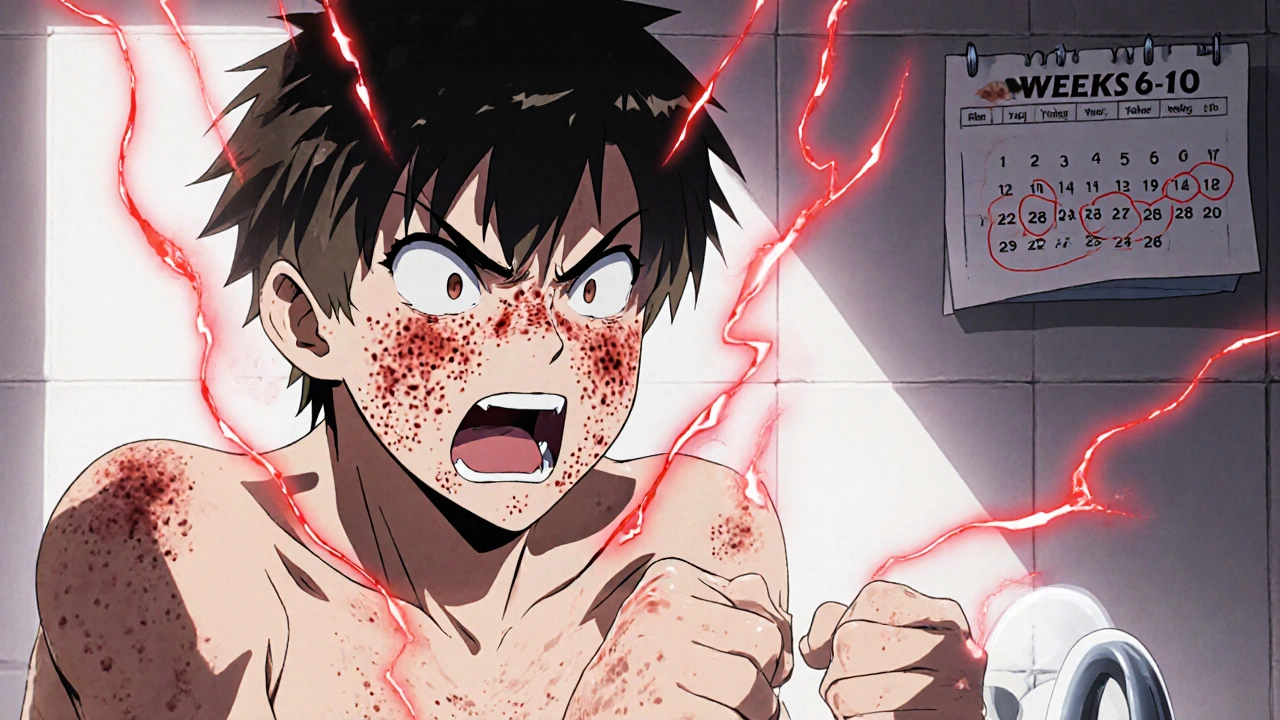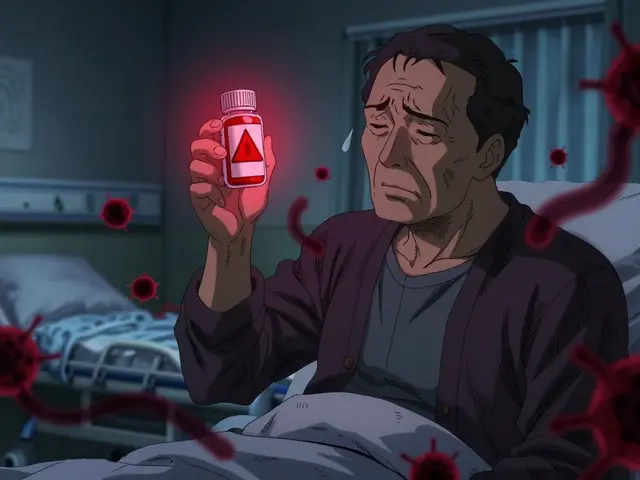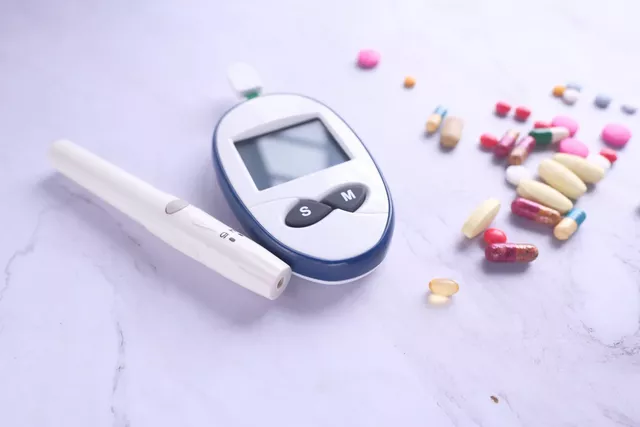Isotretinoin isn’t just another acne pill. It’s one of the few treatments that can actually reset your skin’s biology - for good. But if you’re taking it, you already know it’s not simple. It’s powerful. It’s intense. And if you don’t do it right, you could waste months, risk side effects, and miss the chance to finally clear your skin for good.
Understand Why Isotretinoin Works
Isotretinoin, the generic name for Accutane and other brand names, is a vitamin A derivative. It doesn’t just treat acne - it attacks the root causes. It shrinks your oil glands by up to 90%, reduces bacteria on your skin, stops pores from clogging, and calms inflammation. That’s why, after a single course, about 80% of people see long-term clearance. For many, it’s the end of a decade of breakouts, creams, antibiotics, and frustration.
But it doesn’t work by accident. You need to take it exactly as prescribed. Skipping doses, taking it on an empty stomach, or stopping early because you feel better won’t give you the results you’re after. This isn’t a quick fix. It’s a full-system reset.
Take It With Fat - Always
Isotretinoin is fat-soluble. That means your body can’t absorb it properly unless you take it with food that contains fat. A piece of toast with butter? Not enough. A handful of almonds? Better. A full meal with chicken, avocado, or olive oil? That’s what you need.
Studies show that taking isotretinoin with a high-fat meal can increase absorption by up to 2.5 times compared to taking it on an empty stomach. One Australian dermatology clinic tracked 217 patients and found that those who consistently ate fat with their dose had 40% better clearance rates after 6 months. That’s not a small difference - that’s the difference between clearing your skin and needing a second course.
Plan your doses around meals. Breakfast with eggs and cheese. Lunch with salmon and olive oil dressing. Dinner with lean beef and roasted vegetables. Don’t just grab a pill with a glass of water. That’s how people end up frustrated, thinking the medication isn’t working.
Dosage Matters - More Isn’t Always Better
Doctors usually start you on 0.5 to 1 mg per kilogram of body weight per day. That means a 70kg person might start at 35-70mg daily. But here’s the thing: the total cumulative dose over your entire treatment is what actually predicts long-term success.
The magic number? 120 to 150 mg per kilogram of body weight, total. For that same 70kg person, that’s 8,400 to 10,500mg over the whole course. If you take 60mg a day, that’s about 5 to 6 months. If you drop to 40mg, you might need 8 to 10 months.
Going too low? You risk a relapse. Going too high? You increase side effects without improving results. Studies from the Journal of the American Academy of Dermatology show that patients who hit the 120mg/kg target had a 90% chance of staying clear after treatment. Those who stopped short of 100mg/kg had a 50% relapse rate.
Don’t rush. Don’t cut corners. Stick to the math. Your dermatologist should track your total cumulative dose. If they don’t, ask for it.

Side Effects Are Real - But Manageable
Yes, isotretinoin has side effects. Dry skin, chapped lips, nosebleeds, joint aches, mood changes - they’re common. But they’re not unavoidable. And they’re not a reason to quit.
Here’s what actually works:
- Lips: Use a thick ointment like petroleum jelly, not just lip balm. Reapply every 2 hours. Keep a tube by your bed, your desk, your car.
- Skin: Skip harsh cleansers. Use a gentle, fragrance-free wash like Cetaphil. Moisturize twice a day - even if your skin feels oily. Isotretinoin strips natural oils; your skin will thank you.
- Eyes: Use preservative-free artificial tears. Dry eyes are common. If you wear contacts, switch to glasses during treatment.
- Mood: If you feel unusually down, anxious, or withdrawn, tell your doctor immediately. It’s rare, but real. Don’t ignore it.
- Alcohol: Avoid it. Isotretinoin stresses your liver. Alcohol adds to that stress. One study found that drinkers had a 3x higher risk of elevated liver enzymes.
Most side effects fade within weeks. They’re the price of clearing your skin - not a sign you’re doing something wrong.
Don’t Skip Blood Tests
Before you start, you’ll get blood work. Cholesterol, liver enzymes, triglycerides. Then again at 1 month, then every 3 months. This isn’t bureaucracy - it’s safety.
Isotretinoin can raise triglycerides and liver enzymes. High triglycerides can lead to pancreatitis - a painful, dangerous condition. If your levels spike, your doctor can adjust your dose or pause treatment. But only if they know.
One patient in Melbourne skipped her 3-month test because she “felt fine.” Three weeks later, she was in the hospital with pancreatitis. She recovered, but it took months. She also had to stop isotretinoin - and her acne came back worse.
Set calendar reminders. Treat these tests like appointments with your future self.
Give It Time - The Purge Isn’t Failure
Many people panic around week 6 to 10. Their acne gets worse. New bumps appear. Old ones turn red and angry. They think the treatment isn’t working. They consider quitting.
That’s the purge. And it’s normal.
Isotretinoin pushes out clogged pores that have been building up for months. It’s like cleaning a blocked drain - the gunk comes out first. In clinical trials, about 25% of patients had a temporary flare. But 90% of them saw major improvement by month 4.
Don’t add more acne products. Don’t pick. Don’t stop. Stick with it. Your dermatologist can prescribe a short course of topical antibiotics or a low-dose steroid cream if the flare is severe. But don’t let fear make you quit.

Plan for the Long Term
After you finish, your skin will be sensitive. It’ll take 3 to 6 months to fully stabilize. Don’t rush back into harsh exfoliants, retinoids, or chemical peels. Your skin is still healing.
Use sunscreen daily. Isotretinoin makes your skin more sensitive to UV light. Even on cloudy days. Sun damage now can lead to dark spots or premature aging later.
And yes - some people do relapse. About 10-20% need a second course. That’s not failure. It’s biology. If your acne returns, your dermatologist can reassess. Many people get a second course at a lower dose and still achieve full clearance.
What Not to Do
- Don’t take vitamin A supplements. You’re already getting a massive dose. Extra vitamin A can cause toxicity.
- Don’t get pregnant. Isotretinoin causes severe birth defects. Use two forms of birth control during treatment and for one month after. This isn’t optional.
- Don’t donate blood. The medication stays in your blood for months. Blood banks won’t accept donations during or for a month after treatment.
- Don’t compare your journey to others. One person clears in 4 months. Another takes 8. That’s normal. Your dose, your body, your timeline - it’s yours.
Final Thought: This Is Your Turn
Isotretinoin isn’t magic. It’s science. And like any science, it only works if you follow the rules. Take it with food. Hit your dose target. Get your blood tests. Be patient. Protect your skin. Don’t quit when it gets hard.
If you do, you’re not just treating acne. You’re reclaiming your confidence, your skin, your life. And that’s worth every dry lip, every blood test, every day you stick with it.
Can isotretinoin permanently cure acne?
For about 80% of people, isotretinoin leads to long-term clearance - meaning acne doesn’t come back after treatment ends. For 10-20%, a second course may be needed. It’s not a guarantee, but it’s the most effective treatment available for severe acne.
How long does it take for isotretinoin to start working?
Most people see improvement by week 8 to 12. But many experience a temporary flare between weeks 6 and 10, which can feel like things are getting worse. This is normal and usually clears up by month 3 or 4.
Is isotretinoin safe for long-term use?
Isotretinoin is not meant for long-term daily use. It’s prescribed as a short course - usually 5 to 8 months. Long-term daily use increases the risk of liver damage, high cholesterol, and bone density loss. Always follow your doctor’s prescribed timeline.
Can I drink alcohol while on isotretinoin?
It’s strongly advised to avoid alcohol. Both isotretinoin and alcohol are processed by the liver. Together, they increase the risk of liver inflammation and elevated liver enzymes. Even moderate drinking can be risky during treatment.
Do I need to use sunscreen while on isotretinoin?
Yes. Isotretinoin makes your skin much more sensitive to UV light, increasing the risk of sunburn and long-term damage. Use a broad-spectrum SPF 30 or higher every day - even when it’s cloudy or you’re indoors near windows.
What should I do if my acne gets worse before it gets better?
Don’t stop the medication. This is called a purge and is common. Talk to your dermatologist - they may suggest a short-term topical treatment to calm inflammation. Most flares improve within 4 to 6 weeks.
Can isotretinoin cause depression?
There have been rare reports of mood changes, including depression, during isotretinoin use. While a direct link isn’t proven, doctors take it seriously. If you feel persistently low, anxious, or withdrawn, contact your doctor immediately. Don’t wait.
Can I get laser treatments or chemical peels while on isotretinoin?
No. Wait at least 6 to 12 months after finishing isotretinoin before getting any aggressive skin treatments like lasers, microneedling, or chemical peels. Your skin is more fragile during and after treatment, and these procedures can cause scarring or poor healing.






Just finished my 7-month course last month and my skin has never been better. Seriously, the key was sticking to the fat rule - I started eating avocado toast with eggs every morning and my absorption went from garbage to perfect. Also, never skipped a blood test. My triglycerides spiked a little at month 3, but my derm lowered my dose for two weeks and I was fine. Don’t panic during the purge - it’s your skin screaming to get rid of the junk. I cried in the mirror at week 8, but by week 14? Clear. Worth every dry lip and awkward doctor visit.